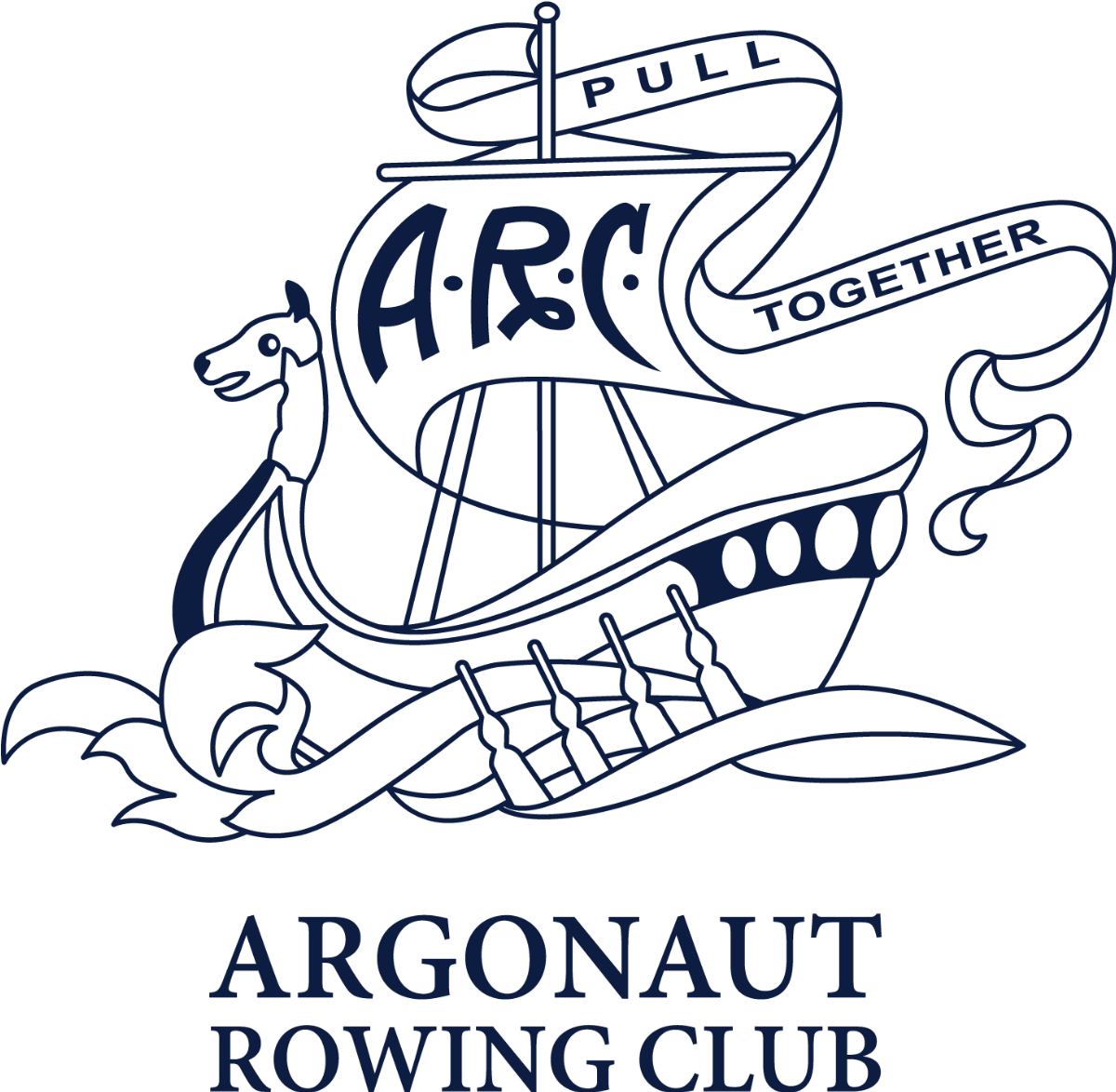Argonaut Olympian Issue #5
"Marnie is definitely Canada's most outstanding rower ever…" Coming from National Team coach Al Morrow, and considering the company she keeps in this sport, that is saying a lot! We are pleased to bring you our fifth ARC Olympian Feature. Long a Canadian icon, Marnie McBean needs no introduction. Her story is well known in the rowing community and among Canadians in general. Read on to learn of her story and maybe a few things you didn't know about her including Nostradamus-like sketches of her future as well as some words of encouragement for our members.
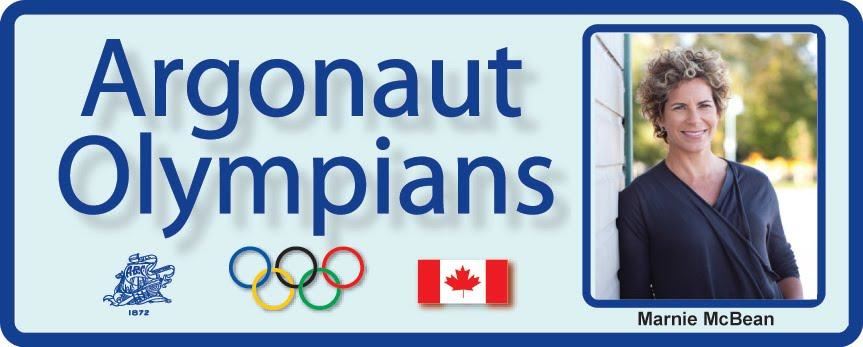
Argonaut Olympians
We are in the midst of honouring our past and present Olympians by documenting their achievements and establishing a permanent archive. An Argonaut Olympian is an athlete who has been a competitive member of the club prior to competing at the Olympic games. Until 1972, athletes represented their club as well as their country at the Olympics. In 1976 a National Team system was developed in Canada, thus ending club representation at the games. Other than footnoting this difference, there is no other discrepancy between the two systems for the purpose of this exercise.
The Argonaut Rowing Club has produced more Olympic crews than any other club in North America while that system existed fielding a total of thirteen crews. Many other members have competed in National Team programs and have been winning gold medals at the Olympics and World Championships with consistency for nearly three decades. This is the fifth of the series, compiled non-chronologically, of our athletes that have donned the double blue and gone on to compete in the Olympic Games.
Part 5 – Marnie McBean – 1992 & 1996 Olympics
Games of the XXV & XXVI Olympiads
In 1992 Canadian Rowing hit a peak winning five medals in total including four gold and one bronze. Led by Marnie McBean and Kathleen Heddle Canada had become a force in world rowing. Many didn't think it would happen again but just four years later we were dominant at the Atlanta Olympics - this time for six medals including gold, four silver and one bronze medal. In 1992 we won more gold medals in rowing than in every other sport combined and tied Germany in total wins despite injuries to several of our best rowers including Silken Laumann (single sculls) and Jenny Walinga (women’s eight). In 1996 it was again Marnie and Kathleen that came up big for Canada winning gold in the women's double and bronze in the quadruple sculls bringing their two-games total to three gold and one bronze. This was good enough for Canada to be deemed the number one rowing nation in the world and good enough for the Guinness book of records to name Marnie and Kathleen as the winningest women in Olympic rowing history at the time.
Despite her status, Marnie remains accessible and was happy to share the story of her Argo roots with us. Our most prolific LTR graduate has been a great ambassador for Canada, for the sport and for the Argonaut Rowing Club. We are proud to have her as part of our community, this is her story.
The hook, an actor rowing a boat
Growing up in Etobicoke, ON Marnie McBean started dreaming of the future greatness while still a high school student. Although engaged in collegiate sports such as swimming she was on the hunt for something she could really excel in. She became inspired to seek out rowing after viewing a Coffee Crisp commercial and later Rob Lowe rowing in the film Oxford Blues. Joining the Argonaut club in 1985 she was keen to start racing soon after completing her Learn to Row session. She wasn't particular about what boat she was in and rowed mostly crew in fours and eights at CORA regattas with various club members, some of whom remain. Jane Shepherd, a national team hopeful herself at the time remembers her Argo days with Marnie well: "Marnie wasn't born into privilege, she achieved greatness with her determined work ethic and is a great role model for all girls. When I rowed with Marnie she progressed quickly and the coach wanted to move her into the faster boat, but she remained loyal to our crew. In the end we ended up beating the 'fast boat'!" Shepherd goes on to say "Marnie was humble, even after her successes, and was also lots of fun socially and I have great memories of those times…"
Marnie continued rowing at the University of Western Ontario which is where she teamed up with what would be an eleven year stint with coach Al Morrow. Commenting on her tenacity, Morrow says "After early success Marnie showed her internal strength by 'hanging in there' for a few years with moderate success but this was rewarded with outstanding results from the moment she first made the National Team in 1989." Beyond rowing, he goes on to say "On top of all her great success as an athlete Marnie has given back to her community and her sport in so many ways, she is truly an outstanding Canadian."
After joining the National Team, victories came fast for Marnie winning the US Nationals four times in 1990/91 and winning twice (pair and eight) at the 1991 Vienna World Rowing Championships the stage was set for her two gold medal performances in Barcelona in 1992. While having sculled in earlier years she went back to this in the single after the Barcelona games with success racing to second at the 1993 World Rowing Championships and winning two FISA World Cup regattas in 1994. At this point she reconnected with Kathleen Heddle and they made the switch from sweep to sculling in the double setting up their gold medal performance in 1996 at the Atlanta Olympics and then the bronze in women's quad. Retiring (she thought) after Atlanta, Marnie found she couldn't stay away from the sport for too long and started her comeback in the single. In 1998 she won the Armada Cup in Bern, Switzerland. In 1999 she won bronze at the Vienna World Cup regatta followed up with gold at the Winnipeg Pan Am games before ultimately having to retire just a few weeks before the Sydney Olympics with a career-ending back injury. While this ended her competitive career, she has attended many Olympics since, winter and summer, as a broadcast journalist or mentor for our athletes.
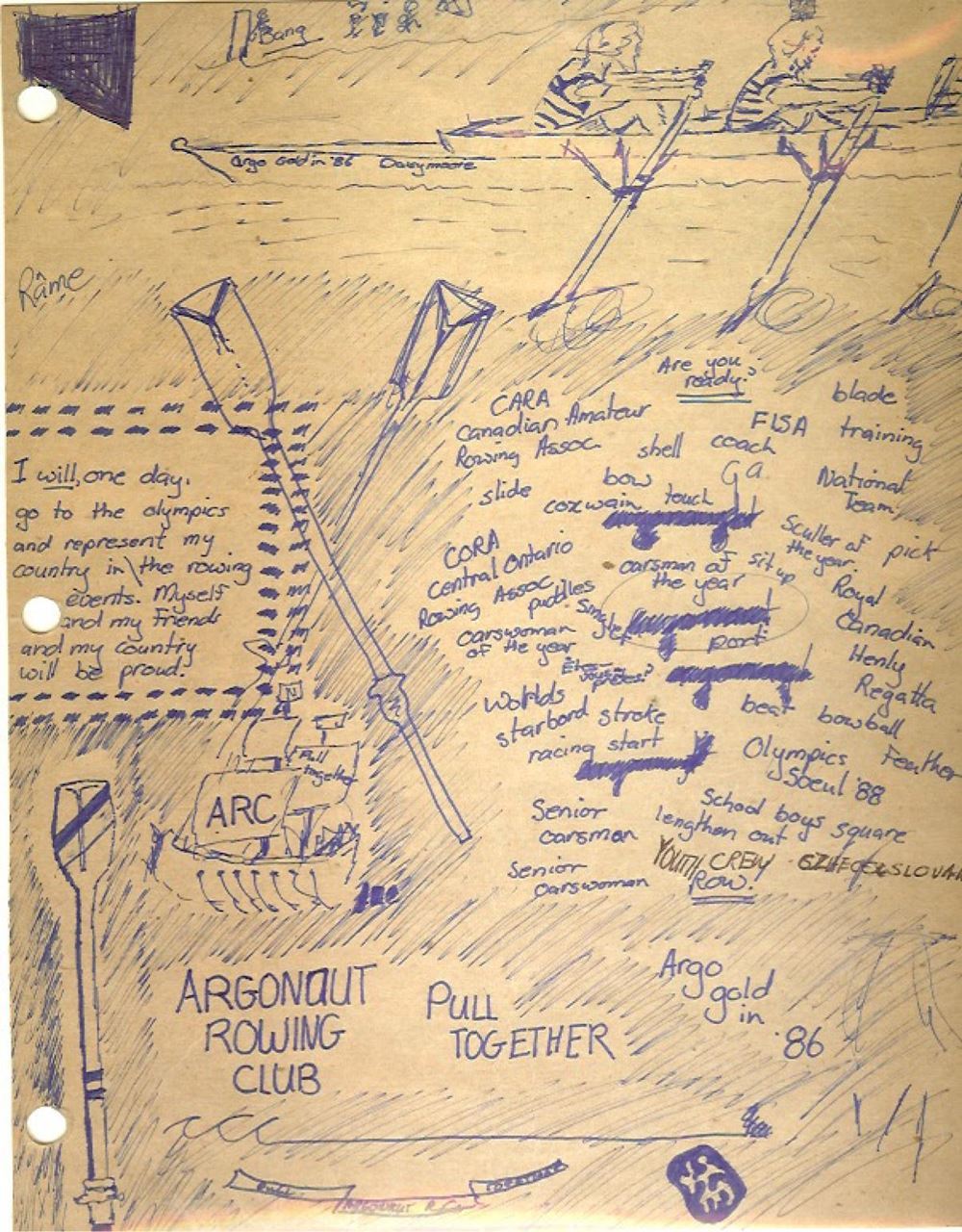 Nostradamus has nothing on Marnie McBean as she accurately doodles her predictions of becoming ARC Oarswoman of the Year, joining the National Team and representing Canada at the Olympics. She also draws a pretty mean galleon!
Nostradamus has nothing on Marnie McBean as she accurately doodles her predictions of becoming ARC Oarswoman of the Year, joining the National Team and representing Canada at the Olympics. She also draws a pretty mean galleon!
Interview with Marnie McBean at ARC - Jan. 13, 2013
GS As some may know, it was a Coffee Crisp commercial and the Rob Lowe movie “Oxford Blues” that drove you to phone the Argonaut Rowing Club and sign up for an LTR session. Please elaborate on that experience.
MM Rowing featured in both of those things and it caught my eye. It looked pretty interesting to me so I asked my mom where I could take up the sport. She had no idea but we found the Argonaut Rowing Club in the phone book and I called them up. In hindsight – I find the fact that someone actually answered the phone pretty amazing. That was 1985; I was a 17 year old Etobicoke CI student and joined Learn to Row at Argos that summer.
GS Who were your influences, athletes and coaches, at the Argonaut Club that you can remember?
MM After LTR I was keen to row in any boat. I have lots of fond memories of rowing with and around Jane Shepherd, Liz and Chris Hartmann, Patty “Paddle” Young, Katherine “BigFun” and of course the ever-present coxie Barry Shaw. The top boat was the Intermediate 8+, which I tried out for – but while I had natural power- I still ranked low on the technique scale! I was relegated to the intermediate coxed four which a collection of similarly keen but fairly novice rowers. I’ll always remember, at one of the first CORA regattas of the season our crew lost in heat 1 which should have been it but Argos had an unused entry in heat 3. Despite Barry insisting we not, we rowed back up to the start, took the entry and won the race! We were disqualified for breaking the rules – but that was the kind of eagerness to race and to figure things out that we had. Terry Neil coached us from his single, but more than any one person, it was the club community at Argos that was the best influence for me.
GS How long after you started rowing did you consider that the National Team might be something worth pursuing.
MM It was a bit random, but the winter after my first season at Argos someone told me about the Jr. National team tryouts. I just needed to do was a Gjessing Erg test and I had no idea what that was. I had no sense of what was good or how things ranked but it turned out that the first erg score I submitted was off the charts. Technically though, I had a lot to learn. I made the ‘86 Junior National Team and went on to win a bronze medal in the pair. I was hooked – and wanted to make the Senior team. At the end of the year, the coach of the Jr. Team told me they had never seen anyone go so fast but row so bad! The comment inspired me to work on my technique. That wasn’t the type of rower I wanted to be and thankfully I did, as my technique was a big part of why I won so many races.
GS I joined Argos in 97 and I remember how impressed I was seeing you help put the docks in at the club after winning all of your gold medals and your iconic status. You were simply there as part of the team, unassuming and willing to help. How has your team-building philosophy impacted your mentoring career?
MM I have awesome memories of Argos and it is the community of Argos that I remember well – The women I rowed with and others like Tanica, Beth, Norma and Sheila, Steve Sandor and the Sr. Masters guys, the men’s four with Xavier, Larry, Tom and Bill—actually-- they were kind of scary!
My first winter at the club we did a lot of group workouts in the Henley Room. They were body circuits consisting of 45 seconds of pulls, jumps, wall sits etc. with a 15 sec ‘run’ to the next station- we had a blast; it was like a family.
There were some other great things I remember as well - like rowing up the Humber on Christmas day, with a group including Bob and Jennifer Blunt, in Santa hats and singing carols. I gathered many bits of advice from people around the club that stayed with me throughout my career.
GS Weeks before the 2000 Sydney Olympics you were set to race and medal in the single when suffered disk ruptures in your back. Suddenly, for the first time, you couldn’t control your narrative. I still remember you crying on television having to make this announcement. How did this change you, did you somehow find peace with yourself in having to let go?
MM My team mate, Jenny Walinga blew out her back in ’92 and I had seen how even years later she was physically limited by her back. In 2000, I was in a much different position than Jenny – I had won Olympic gold already and this allowed me a different perspective as I made my decisions. I didn’t want to take desperate measures and risk a healthy life. I went from being incredibly independent, training three times a day to being in bed for three weeks needing a lot of help from the people around me. Carolyn Caesar, who had been a friend and teammate of mine when I was at Western was our team therapist and she was an amazing resource to me in Australia. It was emotionally painful having to bow out, accepting that I would not be able to race at the Olympics but I was blown away by the kindness people showed me during my injury and recovery. It was an incredible life lesson – that people can be incredibly kind… if you let them.
GS Racing at the Olympic games, did you ever let your mind wander beyond the focus of racing to embrace the spectacle and the incredible experience of all walks of humanity assembled? If so what was your best Olympic moment apart from winning gold medals?
MM Rowers are kind of lucky. We can focus on the Rowing regatta for the first half of the Olympics and then we can enjoy the Olympic Games for the second half. The group of people that I was rowing with at my first Olympics were just so incredibly well balanced and focused on what we were doing, that somehow we managed to keep the focus simply on the small things – the rowing, and not the big crazy things that surround the ‘five ring circus’. That said – the schedule allowed us to go to the Opening Ceremonies and to walk in as part of Team Canada. To see the Olympic Torch arrive and to feel the fireworks open the Olympic Games – my Olympic Games – was incredible. My obvious non-racing highlights are Opening Ceremonies and carrying the flag at the ’96 Closing Ceremony but my favourite memory has to be simply walking around the Olympic Village in Barcelona, knowing that I had 2 gold medals back in my room and realizing that I was at the Olympics and not only did I belong there, I had what everyone wanted. It was an incredible ‘Holy S#!T’ moment!
From the Power of More
GS In the 1st chapter of your book ‘The Power of More’ titled ‘Comfortably Uncomfortable’ you discuss never being satisfied in achieving your goals but to stay hungry and use them as a base to take on the next level – keeping your ambitions a step beyond. Would you say this philosophy defined you as a rower?
MM In the presence of ambition, it’s healthy to have a sense that there is always more. Coupled with that is a sense that possibly we haven’t done enough. For sure this perpetual drive defined much of what I did. I always had a sense that I could always do, be or try a little bit more. “You will pass out long before you die!” was a line that stuck with me. But always reaching like that feels ‘risky’ and that can be scary. When I mentor athletes, I talk a lot about the importance of normalizing those fears; to expect them and be ready to handle them. Every champion has doubts and how you deal with them can make a big difference in the outcome of training and racing.
GS After winning 3 Olympic gold medals and then a bronze in ‘96 in the women’s quad you said you felt envious of the Ukranian crew winning silver to your bronze in the quad - ‘not of their medal but their joy’ That is surprising after winning 3 gold medals. Do you think your absolute focus on winning ultimately diminished any opportunity for spontaneous celebration on the podium or had you simply had enough?
MM Leading into my second Olympics, rowing had become a bit of work. There was an incredible amount of pressure and expectations on us, and somewhere we had let go of the fun. For the quad particularly, we had focused almost completely on trying to beat the Germans and in that, we lost sight of the joy of rowing that boat really well (which equals really fast!). We got caught up focusing on goal instead of task – which is not what had made Kathleen and I so successful in the past. I was only 28 but I needed a change so I retired from the sport – at least I thought so at the time. Ultimately after some time as a snowboard instructor I reconnected to my focus – and my joy! - and went back to competitive rowing.
GS At 5’10 you considered yourself disadvantaged being on the short end of the scale with many of the European women 6’0 – 6’3. You said you counted on many of them having a lazy work ethic because of their genetic advantage and that if you were efficient and tenacious you could beat them. Like Ned Hanlan overcame, you found a way to win despite the odds. But today, with the science of rowing advanced as it is, do you really think the same opportunities exist as they used to?
MM Opportunities always exist and you need to find them. Find a way to throw off your opponent and unsettle them. Maximize your strengths and work doggedly on your weaknesses. I absolutely counted on young athletes being ‘lazy’, but its naïve to think that they won’t eventually mature and figure out how to work harder. I had to overcome physically much larger athletes who often took a lead from me off the start. To do this I knew I had to efficiently persist through the middle, reversing any lead that they had. Best case scenario this would ‘break’ them but I had to be ready to hold them off as we’d all push for the finish.
GS Do you have any words of inspiration to motivate our athletes this season.
MM You’ll regret more of the things that you don’t try for, than the things that you do. When the doubts start chirping in your head… treat them like an old friend that you were expecting and then … try anyways. You’ll never know until you do.
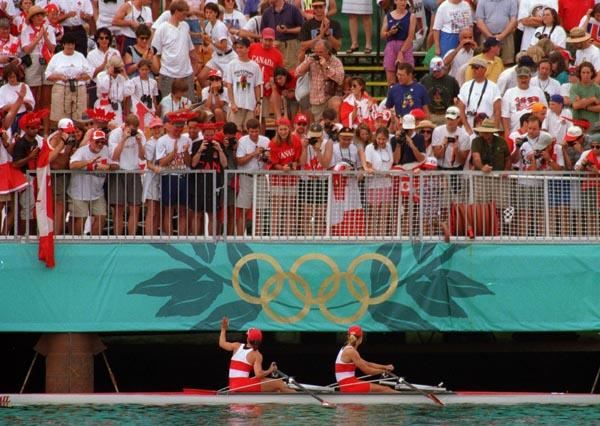
The After (rowing) Life
Despite retiring from competition, Marnie McBean has found many outlets for her enthusiasm and passion for competitive sport. She has be found commenting on Olympic rowing with CTV's Brian Williams when she is not climbing Mt. Kilimanjaro or participating in the Eco-Challenge. Currently she is mentoring Canadian athletes of all disciplines preparing them emotionally and psychologically for battle at the upcoming Sochi Winter Olympics. She also works with Because I am a Girl promoting girls' rights and education around the world. She has guest coached many promising athletes over the years. But in the brief moments out of the spotlight, maybe on a quiet Laurentian evening, you might find her dropping her single into the lake and going for solitary row perhaps reflecting on her remarkable life.
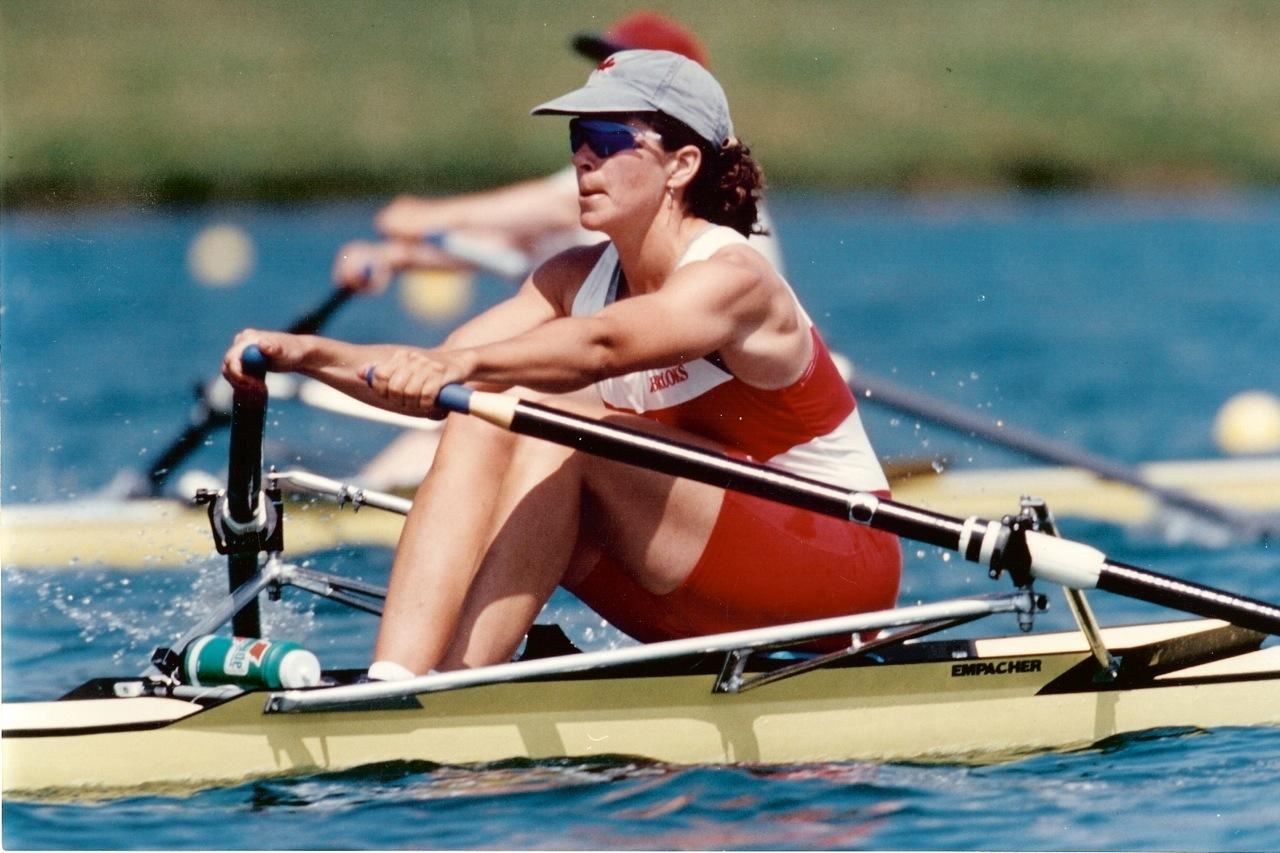
Marnie McBean - Rowing Biography, Notable Achievements
BIO & Selected Notable Achievements
- 1968 - Born in Vancouver, BC.
- 1982 - Attended Etobicoke Collegiate Institute
- 1985 –Enrolled in Argonaut RC Learn to Row Program
- 1985 - ARC Oarswoman of the Year
- 1986 - Joined Junior National Team,
- 1987 - Bronze Women's Pairs Racice Jr. World Championships
- 1988 - Rowed for University of Western Ontario
- 1989 - Joined National Team
- 1990 - GOLD Women's Coxed Four Indianapolis US Nationals
- 1990 - GOLD Womens Eights Indianapolis US Nationals
- 1991 - GOLD Women's Pair Indianapolis US Nationals
- 1991 - GOLD Women's Eight Indianapolis US Nationals
- 1992 - GOLD Women's Pair Lucerne FISA World Cup
- 1992 - GOLD Women's Pairs Barcelona Olympics
- 1992 - GOLD Women's Eights Barcelona Olympics
- 1993 - Silver Women's Single Racice World Rowing Championships
- 1994 - GOLD Women's SIngle Duisburg World Cup Rowing
- 1994 - SIlver Women's Double Indianapolis World Rowing Championships
- 1995 - GOLD Women's Double Mar del Plata Pan American Games
- 1995 - GOLD Women's Double Mar del Plata Pan American Games
- 1996 - GOLD Women's Double Atlanta Olympics
- 1996 - Bronze Women's Quadruple Sculls Atlanta Olympics
- 1997 - Inductee - Canadian Sports Hall of Fame
- 1998 - Silver Women's Coxed Four Cologne World Rowing Championships
- 1998 - GOLD Women's single Bern Armada Cup
- 1999 - GOLD Women's Single Winnipeg Pan American Games
- 2000 - WD Women's Single Sydney Olympics
Medal Count - Rowing Events – Games of the XXV Olympiad – Barcelona, SP
| |
Gold |
Silver |
Bronze |
Total |
| Germany |
4 |
3 |
3 |
10 |
| Canada |
4 |
0 |
1 |
5 |
| Romania |
2 |
4 |
1 |
7 |
Medal Count - Rowing Events – Games of the XXVI Olympiad – Atlanta, US
| |
Gold |
Silver |
Bronze |
Total |
| Australia |
2 |
1 |
3 |
6 |
| Germany |
2 |
1 |
1 |
4 |
| Switzerland |
2 |
0 |
0 |
2 |
| Romania |
2 |
0 |
0 |
2 |
| Canada |
1 |
4 |
1 |
6 |
Grant Sommers 2013
